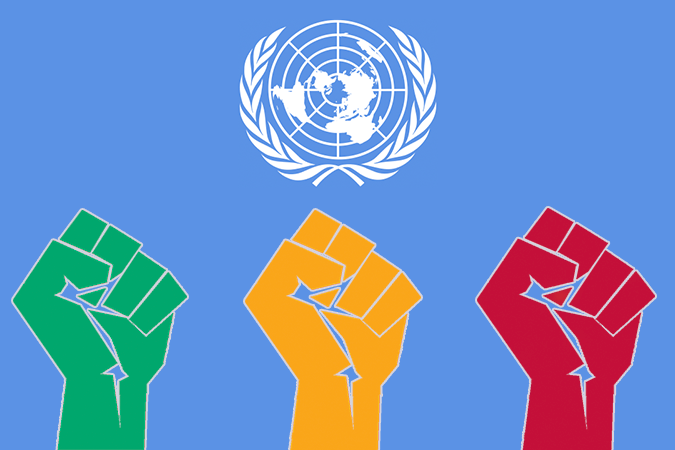Text by Lauriane Selimi
December 2019: Aung San Suu Ki, a Nobel Peace Prize laureate and current State counsellor of Myanmar, was in The Hague to defend her country against the allegations of genocide presented by Gambia; Farida Adelkhah and Kylie Moore-Gilbert, two academics locked up in Tehran started a hunger strike « in the name of academic freedom » and claimed they were subjected to psychological torture; the trial for the Khashoggi assassination was qualified as a « mockery » by the United Nations special rapporteur on extrajudicial, summary or arbitrary executions.
While human rights were violated before, even after the creation of an international system, breach of human rights has remained frequent and are still part of our world reality. What requires an explanation is how human rights continue to be threatened and violated, in spite of the international treaties ratified by a large number of countries.
Today, human rights treaties are widely perceived as being in need of further development, in order to promote those rights and protect people (“all human beings, regardless of race, sex, nationality, ethnicity, language, religion, or any other status”, according to the UN definition). The creation of this international system started with the proclamation of the Universal Declaration of Human Rights by the United Nations General Assembly in 1948. Like the current French Minister of Foreign Affairs Jean-Yves Le Drian puts it, international human rights treaties “are commitments, principles of law guaranteed by solemn declarations or legally binding treaties with a universal scope. The Universal Declaration of Human Rights has been the foundation of this protective edifice”. Over the years, nine other treaties have been adopted, aiming to protect civil, political, economic, social and cultural rights, as well as women, children, people with disabilities, etc. In order to monitor the treaties’ application by the member states’ governments, committees have been created. Their role is to oversee the states’ adherence to their obligations, and, if not, to make recommendations.
Almost all the advocates of this system agree it is still far from being perfect. First of all, human rights violations remain constant and serious: “people in power are often tempted to discriminate against a disfavored minority, order torture in the name of fighting terrorism or silence a pesky critic if they can get away with it”, says Kenneth Roth, the executive director of Human Rights Watch. Another problem is the lack of resources: according to the former United Nations High Commissioner for Human Rights Navi Pillay, talking about the monitoring bodies, “there has been chronically insufficient attention given to properly resource this fundamental human rights mechanism”.
Nevertheless, they consider that the international human rights system is useful. First, it is the driving force of some significant advances. In Europe, the European Convention on Human Rights has been the basis for improving prisoners’ living conditions. It also provides stable and solid justifications for the governments. For example, the Convention on the Elimination of All Forms of Discrimination against Women (CEDAW) has been cited so as to pass the Matrimonial Property Act in Kenya in 2013. It may offer grounds for civil society to condemn states’ behaviour, in front of the Human Rights Council for example. Moreover, some argue, like Cassel, that international human rights treaties have “indirect effects”: they can enhance domestic dialogue and public debate about issues related to human rights and facilitate the creation of a transnational process.
However, there are also critics who consider that this international system should not exist. They explain that it is not affordable for some of the member states to enforce many provisions of the treaties (for example, the right to a fair trial requires funding). They also claim that there are too many obligations the states’ governments are supposed to follow, and these obligations are too imprecise.
A more nuanced answer would be the one developed by Oona Hathaway, Professor of international law at the Yale Law School, thanks to an empirical study. She shows, on the one hand, that international human rights treaties are efficient in the fully democratic countries, and particularly when associated with an engaged civil society. On the other hand, she identifies an “expressive role” of human rights treaty ratification, since states with less democratic institutions are more likely to violate the treaty they have ratified. In fact, as soon as a state with fewer democratic institutions ratifies the Treaty, it improves its image and avoids pressure from other states. Moreover, the monitoring bodies’ capacities being very weak, states do not really face any repercussions.
Hence, international human rights treaties seem to be effective, but not for everyone, not all the time. Many factors have to be taken into account and the system needs to be improved so as to achieve its ambition of universality.
To ensure the compliance of the states with their obligations, a global mechanism has been created at the Human Rights Council: the Universal Periodic Review. It carries out a review of all the UN member states’ records regarding human rights, with one part of the control being dedicated to the compliance with the ratified treaties. This kind of review is likely to be more efficient than the one carried out by the monitoring bodies of the treaties, as the use of the Council as a “chamber of peer review” can lead to certain member states being put under the spotlight so to speak, and often being subject to pressure from other members.
Nowadays, the issue that needs to be resolved urgently is the lack of resources at the UN. It is an overarching problem for the organization but has huge consequences on the efficiency of the human rights system. It is one of the three pillars of the UN (together with peacekeeping and development) but only receives around four per cent of the budget. In 2019, budget cuts have threatened the hearings scheduled by the monitoring bodies’ committees. Like the Chairpersons of the committees said: “the cancellation of sessions will also have numerous other negative consequences, and will seriously undermine the system of protections which states themselves have put in place over decades”.





